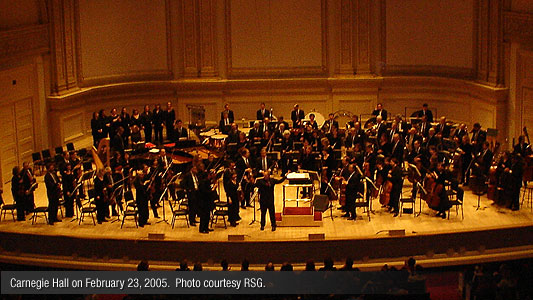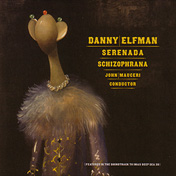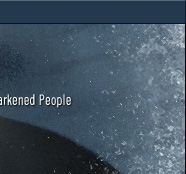Serenada Schizophrana (2005)
Music Composed and Produced by Danny Elfman
Orchestrations by Steve Bartek, Edgardo Simone
Conducted by John Maurceri
Recorded by Armin Steiner
Mixed by Dennis Sands and Armin Steiner

Label (Catalogue): Sony Classical, (89780-2)
Availability: In print
Purchasing options: Available at Amazon.com


"Serenada Schizophrana was a completely new experience for me. As a film composer, I've always had visuals to drive my orchestral music. Serenada began as a commission from the American Composers Orchestra in New York with very few restrictions. As I'd never done anything like this before, figuring out how to begin was daunting. I began composing several dozen short improvisational compositions, maybe a minute each. Slowly, some of them began to develop themselves until finally I had six separate movements that, in some abstract, absurd way, felt connected. Free from film restrictions, I more or less let the movements take themselves wherever they wanted to go in a kind of musical stream of consciousness (which, with the way my brain works, was not a very smooth stream.) The finished piece premiered at Carnegie Hall in February 2005 with Steven Sloane conducting. It was, to say the least, a thrilling and surreal experience for me.
Naturally, I have many musical influences. On some level, both conscious and unconscious, they were probably all affecting my writing. They range from the early film composers such as Bernard Herrmann, Nino Rota, Dimitri Tiomkin, Max Steiner and Erich Korngold, to my "classical" influences of Sergei Prokofiev, Igor Stravinsky, Béla Bartók, Dmitri Shostakovich and Carl Orff. I also cannot omit early Kurt Weill and Duke Ellington as playing an equal role, along with the enigmatic Harry Partch and one of my few living influences, Philip Glass.
In general, I consider myself to be a musical throwback. I am forever attached to the music of the early 20th century when, for me, orchestral music flourished alongside the creation of jazz in a unique and remarkable way. I suppose this piece mixes up all my influences in a kind of musical "gumbo." I hope it's interesting and perhaps even entertaining." - Danny Elfman


Review by Paul Cote -- It's amazing to think that Elfman was commissioned to write a piece for Carnegie Hall last year, considering that 15 years ago the classical community wouldn't even give him credit for composing his own music. But if anyone was still on the fence as to whether or not Elfman was one of the most daring and original compositional voices writing in any field today, his resulting Serenada Schizophrana that premiered in the spring of 2005 crushed any lingering doubts. Daring and thrilling, Elfman managed to take all of his signatures and thrust them into territory that was bold and unpredictable even by his standards. For the past year, fans who didn't make the premier had to sit through Imax screenings of Deep Sea 3D if they wanted to hear even the smallest fragment of Elfman's new work (buried beneath narration and sound effects, no less). Finally, however, we have a legit CD release with a bravado performance conducted by John Mauceri that actually lives up to the thrilling potential of Elfman's music. Suffice to say, hearing a complete crystal-clear recording of this piece is nothing short of a revelation.
I don't usually go for the track-by-track analysis, but as this disc has so few tracks (each a complete piece of music in its own right), I'll make an exception this time. Elfman introduces his work with the manic and thrilling movement, "Pianos" (guess which instrument's featured – the answer may surprise you). His writing for piano, scarcely hinted at in his film work, is nothing short of brilliant, by equal turns rhapsodic and impressionistic. Evoking strong shades of Prokofiev (particularly his "Piano Concerto Number 1"), Ravel, Rachmoninof, and even Brubeck (especially when Elfman pushes the meter into a manic 7/8 around the midway point), this piece has been informed by the best, and it's breathtaking to hear. Elfman manages to give the instrument room for virtuosity without loosing the sense that it's organically connected to the full ensemble, a feat that only the finest composers (like the aforementioned group) have been able to pull off with the same aplomb. Structurally, the piece also features Elfman in top form. After so many film scores with cues that end on the fly, it's a thrill to hear him write extended pieces that truly have a beginning, middle, and end.
The next piece, "Blue Strings," is perhaps the most difficult movement, entrenched firmly in his Dolores Clairborne mode of anguished string writing. That said, if you can stomach the long hall, it's powerful and at times chilling music, especially when the composer pushes the pained melody to the forefront in the movement's climax. Many will jump to compare this portion of the work to Herrmann, but the music, down to the harsh timbre of the violas, is unmistakably Elfman.
"A Brass Thing" brings him back into more mock-pomp territory, shifting back and forth between one of his signature macabre marches and off-kilter jazz passages. Oddly enough though, the real star of this movement isn't the brass but the woodwind section – the plaintive flute duet at the end of the piece are chilling, and should go a long way towards destroying the assumption that Elfman doesn't know his way around an orchestra.
He follows that with "The Quadruped Patrol," a piece reportedly inspired by the image of a big dog and a small dog roaming the neighborhood. The piece is fittingly playful at first, with syncopated gasps from the organ and choir effectively simulating a dog's panting without turning it into anything cloying. Make no mistake though – as the music gathers momentum, the piece it very quickly accumulates into something much more menacing than that cartoonish image would suggest, as Elfman runs further and further with macabre abandon until the music literally seems to run out of breath.
But "I Forget," is by far the highlight, and the piece that most feels like a return from the emotionally biting and melodic Elfman from yesteryear. He manages to turn a playfully surrealist Spanish poem about misplacing an idea into an epic cantata, complete with choir, orchestra, bells, vibes, and his usual cavalcade of African percussion sweeteners. The effect is nothing short of astonishing, a merging of the choral heartbreak and horror of his Edward Scissorhands years with the progressive minimalist and modernistic refinement of his current work. Certainly, he alludes to Carl Orf and Saint-Saens in this piece, but this is by and large the best complete example to date of Elfman's original signature as a composer.
The final movement, "Bells and Whistles," wanders through dreamlike minimalist textures before the dramatic return of the rhapsodic piano leads the orchestra into a blistering climax. All of the tension the work has accumulated over the past 40 minutes explodes in a blistering release that is sure to make your goosebumps rise to attention. It's a grand finish and a fitting way to pull things full circle without sacrificing that sense of freeform abandon.
When Serenada Schizophrana piece premiered at Carnegie Hall last year, this was how the work ended. In the intervening months, however, Elfman has gone back and tinkered with the music, resulting in a feint reprise of the "Quadruped Patrol" material that now closes the serenada with "End Tag." Many have criticized the piece as being the most anticlimactic finish possible, but I think that's the point and it's rather fitting with Elfman's wry sense of humor. It's as if the two dogs from the "Quadruped Patrol" are trying to catch up with the Serenada and don't realize that the work has already ended without them. We also get a brief bonus piece entitled "Improv for Alto Saxophone," an expansion of a brief idea from the fifth movement. Nothing of real substance emerges, but it's a tragic, soulful little piece and it's a welcome addition to the album.
Serenada Schizophrana is certainly not for all tastes, but anyone with a passing interest in either Elfman or progressive contemporary concert music should purchase this CD as soon as is humanly possible. It does what the best concert music does – it pummels you with emotions and sets your imagination racing, desperate to create images worthy of the fantastical sounds you're hearing. Now how many film scores released in 2006 can make that claim?


Adding another facet to an already brilliant life in music, Danny Elfman steps out from his career-defining role as a Grammy Award-winning, Oscar-nominated composer of original music for film and television with the release of Serenada Schizophrana, his first orchestral composition written specifically for the concert hall.
The world premiere of Serenada Schizophrana at Carnegie Hall on February 23, 2005 drew ecstatic reviews across-the-board from both classical music and pop culture critics. It subsequently received worldwide exposure as the featured music in the soundtrack to the IMAX film Deep Sea 3D which was narrated by Johnny Depp and Kate Winslet. The Sony Classical recording is conducted by John Mauceri, best known for his sixteen years as conductor of the Hollywood Bowl Orchestra.
The genesis of Serenada Schizophrana was a commission from the American Composers Orchestra (ACO), a new honor for Elfman and a challenge that he welcomed. Without the usual visuals to drive his orchestral music, he writes, "I began composing several dozen short improvisational compositions, none of them related. Slowly, some of them began to develop themselves until I had six separate movements that, in some abstract, absurd way, felt connected."

Serenada Schizophrana was scored for large orchestra, electronics, two pianos, and female voices. "With six movements, rolling piano solos … and the charming hoots and chirps of eight female voices," wrote Bernard Holland in the New York Times, "Mr. Elfman gave us music comfortable in its own world and highly professional in its execution … The composer of this piece has an ear for symphonic colors and how to balance them."
"In keeping with the piece's title," Mac Randall also noted at the time in the New York Observer, "the music veered madly from Ellingtonian whimsy to Bernard Herrmannesque agitation … The tortured swing of the third movement conjured up the image of a jazz band on a storm-tossed raft, with trash-can cymbals acting as the crashing waves. And the furious horn-stoked climax and surprising last-second resolution of the closing movement made for a rousing finish."
For Elfman, a self-taught musician who had never heard any of his orchestral music performed live on stage, it was a "thrilling experience." Highly influenced by the work of such mid-20th century film composers Bernard Herrmann, Nino Rota, Dimitri Tiomkin, Max Steiner and Erich Korngold, among many others, Elfman's music is also tempered by Prokofiev, Stravinsky, Orff and Bartók, as well as early Duke Ellington. "I am forever attached to the music of the early 20th century," Elfman writes. To this mix, he adds his recent discoveries of Harry Partch, Philip Glass and Lou Harrison.
Serenada Schizophrana is published by G. Schirmer, Inc./Associated Music Publishers, Inc.

Back to filmography index
|
|



|















